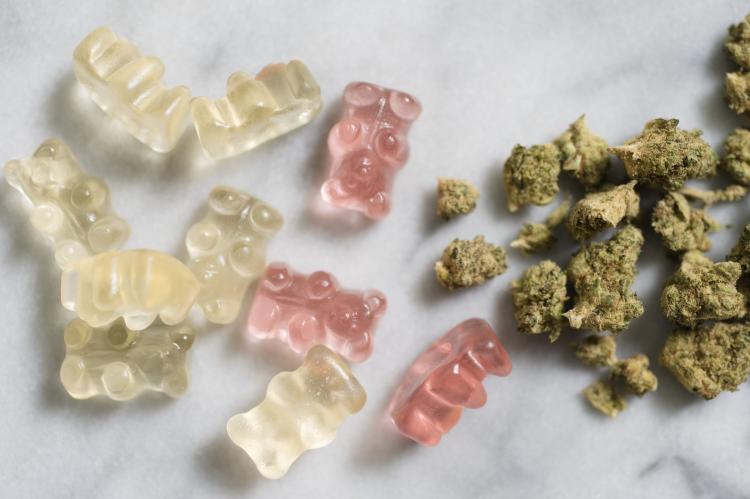Coronavirus gave cannabis companies a big bump in sales and it wasn’t just for the wake-and-bake set
As a wide range of American economy sectors ground to a halt in response to the coronavirus crisis, one particular industry headed in the other direction. Across the United States during the week of March 16, cannabis dispensaries saw their sales soar by double digits. One company dealt with hour-long lines at its Pennsylvania stores. On March 16th alone, sales doubled in California.
Roy Bingham, CEO of cannabis market research firm BDS Analytics, said he expects the industry to not only ride out the coming economic storm but continue to grow. His firm has yet to revise its prediction of a 30% jump to $17 billion in U.S. retail sales for 2020. “First, you have this existing core demand; 65% of cannabis consumers consume on a daily basis,” said Bingham. “And now you have people who can’t go to the gym or the bar and are locked up at home, where about half of all cannabis consumptions happens anyway.”
Though sales flattened out after that initial bump in sales, the demand for cannabis isn’t expected to dip anytime soon. Thus far, none of the 22 states with legal marijuana dispensaries have ordered them closed (although Nevada moved to delivery only and some companies have decided their customers must order online before coming to the store). Most U.S. dispensaries remain open, often classified as essential services, though, in Canada, Ontario took pot shops off the essential list and ordered them closed by April 3.
The fact that marijuana could remain one of the fastest growing sectors of the economy has much to do with the fact the product is hardly just for stoners anymore. In recent years, cannabis companies have been busy opening new dispensaries in mainstream, high traffic locations. Sleek, spacious, and uncluttered, they often look more like Apple stores or places to buy upscale furniture than traditional headshops that appealed more to counterculture types. The goal is, at many of the newer shops, to educate consumers and entice people to think of marijuana as no different than a glass of wine or a few beers.
“The stoner stereotype is not dead, but it’s not the primary cannabis consumer these days,” said Jessica Lukas, vice president of consumer insights at BDS Analytics.
Cannabis 2.0 consumers are older and more female than cannabis enthusiasts of years past, and they’re showing up at dispensaries not just to get high but for health and wellness needs. “A good night’s sleep and pain relief are the biggest drivers for people coming into our stores,” said Jennifer Dooley, chief strategy officer at Green Thumb Industries, which operates Rise dispensaries in seven states.
Even High Times, the longtime chronicler of the stoner lifestyle and a “magazine of high society” tagline, is going mainstream. Stormy Simon, High Times CEO, said the company will open two “clean and inviting” dispensaries in Las Vegas and Los Angeles later this year. They will feature legacy High Times memorabilia but also welcome people who have little-to-nothing in common with old-school stoners “with open arms.”
Much like other dispensary companies, High Times will bring in new consumers with the help of new kinds of cannabis products. While straight marijuana, or flower, remains a core product, the fastest growing categories are edibles and other smokeless options—from gummies and chocolates to tinctures, breath sprays, and bath salts. Instead of touting THC levels or “terpene profiles,” these products are packaged to appeal to specific consumer segments or address a particular need. Green Thumb’s Feel Collection tinctures, for instance, loos like something you might buy in a beauty store. Packaged in elegant purple, blue, and green glass bottles, the products target middle-aged women (“blends cannabis extracts with natural ingredients to make every day a little more heck yeah”). Each product promises a desired effect, including comfort, dreamy, energized, relaxed, or healed.
There is even cannabis in capsule form that’s packaged in the well-known look of a prescription drug bottle. “We’re not going to ask grandma to roll a joint, so we focus on forms that are familiar and comfortable to people,” says Greg Butler, chief commercial officer at Cresco, which sells Remedi cannabis capsules. Brands also focus on appealing to people who worry their weed will leave them unable to get off the couch and function normally (aka “couch lock”), though that may be less of an issue during the coronavirus lockdown. “Our Beebo brand has much more subtle, lower THC levels. We call it a social dose. You can enjoy it but still go on with your day,” said Green Thumb’s Dooley.
But perhaps no consumer is as attractive to cannabis companies as seniors. Not only are they more likely to have medical conditions that cannabis could address, they’re also the most free-spending of all users. According to Eaze, a cannabis software platform and marketplace, baby boomers spend, on average, close to 30% more at dispensaries than millennials. Yet reaching these consumers, along with other segments of the population, is a challenge because marijuana’s continued illegal status at the federal level renders TV and digital ads off limits. As a result, many companies are taking their pitch directly into senior communities.
Earlier this month, Trulieve, which operates 45 dispensaries in Florida, hosted a “Silver Tour” at a large retirement community in Tamarac, Fla. Featuring free Panera Bread and a doctor who spoke about marijuana and medical conditions, it drew several hundred attentive audience members. “When I started doing this, they said, ‘We don’t want these shows; our people are not interested in marijuana,’” said Robert Platshorn, a marijuana activist who runs and organizes these events for Trulieve. “Now it’s a matter of getting to all the senior communities who would like to have us.”
- Log in to post comments

